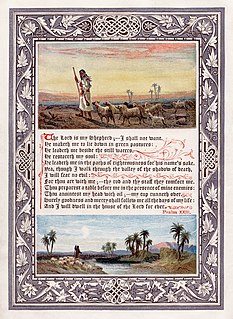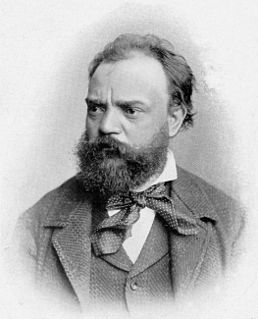
John Milford Rutter is an English composer, conductor, editor, arranger, and record producer, mainly of choral music.

Psalm 23 is the 23rd psalm of the Book of Psalms, generally known in English by its first verse, in the King James Version, "The Lord is my Shepherd". The Book of Psalms is the third section of the Hebrew Bible, and a book of the Christian Old Testament. In the Greek Septuagint version of the Bible, and in its Latin translation in the Vulgate, this psalm is Psalm 22 in a slightly different numbering system. In Latin, it is known by the incipit, "Dominus reget me"
"My Cup Runneth Over" is a quotation from the Hebrew Bible and means "I have more than enough for my needs" though interpretations and usage may vary.

"Vater Unser, Part II " is the eighth single released by the German music project E Nomine, and appears on the 2004 album Das Beste aus... Gottes Beitrag und Teufels Werk. This tracks is a mix of 'Vater Unser' and 'Psalm 23' from "Das Testament" (1999).

John Rutter's Requiem is a musical setting of parts of the Latin Requiem with added psalms and biblical verses in English, completed in 1985. It is scored for soprano, mixed choir and orchestra or chamber ensemble.

Psalm 98 is the 98th psalm of the Book of Psalms, generally known in English by its first verse, in the King James Version, "O sing unto the Lord a new song; for he hath done marvellous things". The Book of Psalms is the third section of the Hebrew Bible, and a book of the Christian Old Testament. In the Greek Septuagint version of the bible, and in its Latin translation in the Vulgate, this psalm is Psalm 97 in a slightly different numbering system. In Latin, it is known as "Cantate Domino". The psalm is a hymn psalm, one of the Royal Psalms, praising God as the King of His people.

Psalm 130 is the 130th psalm of the Book of Psalms, one of the Penitential psalms. The first verse is a call to God in deep sorrow, from "out of the depths" or "out of the deep", as it is translated in the King James Version of the Bible and the Coverdale translation respectively. The Book of Psalms is the third section of the Hebrew Bible and a book of the Christian Old Testament. In the Greek Septuagint version of the Bible, and in the Latin Vulgate, this psalm is Psalm 129 in a slightly different numbering system. In Latin, it is known as De profundis.
Jessie Seymour Irvine was the daughter of a Church of Scotland parish minister who served at Dunottar, Peterhead, and Crimond in Aberdeenshire, Scotland. She is referred to by Ian Campbell Bradley in his 1997 book Abide with Me: The World of Victorian Hymns as standing "in a strong Scottish tradition of talented amateurs ... who tended to produce metrical psalm tunes rather than the dedicated hymn tunes increasingly composed in England".

"The Lord's my Shepherd" is a Christian hymn. It is a metrical psalm commonly attributed to the English Puritan Francis Rous and based on the text of Psalm 23 in the Bible. The hymn first appeared in the Scottish Psalter in 1650.

Psalm 22 is the 22nd psalm of the Book of Psalms, generally known in English by its first verse, in the King James Version, "My God, my God, why hast thou forsaken me?". The Book of Psalms is the third section of the Hebrew Bible, and a book of the Christian Old Testament. In the Greek Septuagint version of the bible, and in its Latin translation in the Vulgate, this psalm is Psalm 21 in a slightly different numbering system. In Latin, it is known as "Deus, Deus meus".

Psalm 118 is the 118th psalm of the Book of Psalms, generally known in English by its first verse, in the King James Version, "O give thanks unto the LORD; for he is good: because his mercy endureth for ever." The Book of Psalms is the third section of the Hebrew Bible, and a book of the Christian Old Testament. In the Greek Septuagint version of the bible, and in its Latin translation in the Vulgate, this psalm is Psalm 117 in a slightly different numbering system. In Latin, it is known as "Confitemini Domino quoniam bonus quoniam in saeculum misericordia eius". Its themes are thanksgiving to God and reliance on God rather than on human strength.

Der Herr ist mein getreuer Hirt, BWV 112, is a cantata by Johann Sebastian Bach, a church cantata for the second Sunday after Easter. Bach composed the chorale cantata in Leipzig and first performed it on 8 April 1731. It is based on the hymn by Wolfgang Meuslin, a paraphrase of Psalm 23 written in 1530, sung to a melody by Nikolaus Decius.

The Lord is My Shepherd is an 1863 oil on wood painting by American artist Eastman Johnson. The painting measures 16 5/8 x 13 1/8 in. and is on display at the Smithsonian American Art Museum.

Tre Motetter, FS 139, Op. 55, is a composition for unaccompanied choir by Carl Nielsen. It is a setting of three quotations in Latin from different psalms chosen by the composer and his wife Anne Marie Carl-Nielsen. The three motets, Afflictus sum, Dominus regit me and Benedictus Dominus were first performed on 11 April 1930 at the Ny Carlsberg Glyptotek by Mogens Wöldike and the Palestrina choir, to whom they are dedicated. Among the composer's last works, they were published in 1931 by the Skandinavisk Musikforlag in Copenhagen.

Biblical Songs is a song cycle which consists of musical settings by Czech composer Antonín Dvořák of ten texts, selected by him, from the Book of Psalms. It was originally composed for low voice and piano. The first five songs were later orchestrated by the composer.
Adolphus Hailstork’s “I Will Lift Up Mine Eyes” is a cantata for a tenor soloist in three sections.
The Lord is my Shepherd is a sacred choral composition by John Rutter, a setting of Psalm 23. The work was published by Oxford University Press in 1978. Marked "Slow but flowing", the music is in C major and 2/4 time. Rutter composed it for Mel Olson and the Chancel Choir of the First United Methodist Church in Omaha, Nebraska. He later included the work as a movement in his Requiem of 1985, then with orchestra or chamber ensemble.. In 1993, Rutter also made it part of his Psalmfest, a collection of nine psalms written over 20 years. For that version, he used also soloists.
Melvin Donald Olson was an American choral conductor who is known for introducing the compositions by John Rutter to the United States.

Ezekiel 34 is the thirty-fourth chapter of the Book of Ezekiel in the Hebrew Bible or the Old Testament of the Christian Bible. This book contains the prophecies attributed to the prophet/priest Ezekiel, and is one of the Books of the Prophets. In this chapter, Ezekiel prophecies against the "irresponsible shepherds" of Israel and states that God will instead seek out God's sheep and become their "true shepherd". The Jerusalem Bible notes the continuity of this theme, occurring in Jeremiah 23:1-6, here in Ezekiel, and later resumed in Zechariah 11:4-17, as well as in the New Testament.
O clap your hands is an anthem in English for choir and organ by John Rutter. He composed the setting of verses from Psalm 47 in 1973 for a four-part choir and organ, and also made a version with orchestra. It was first published in 1973. Later, Rutter included it in Psalmfest, a collection of nine psalm settings.











